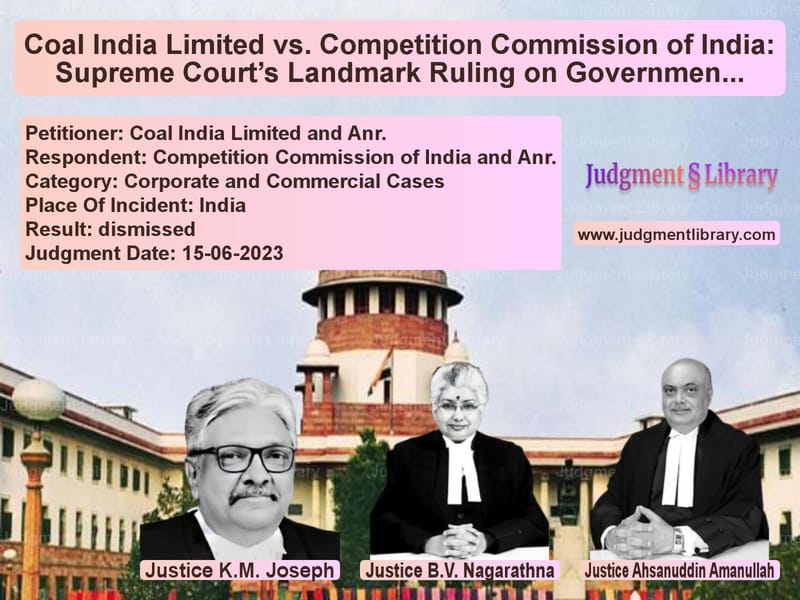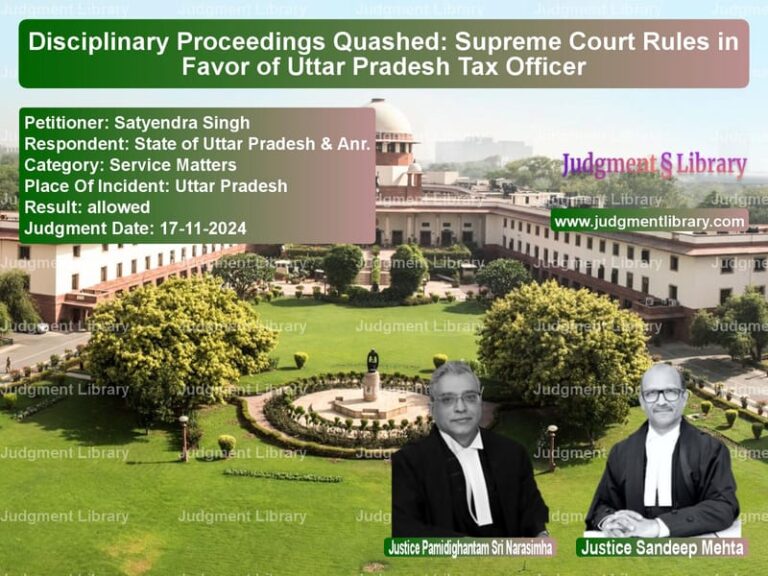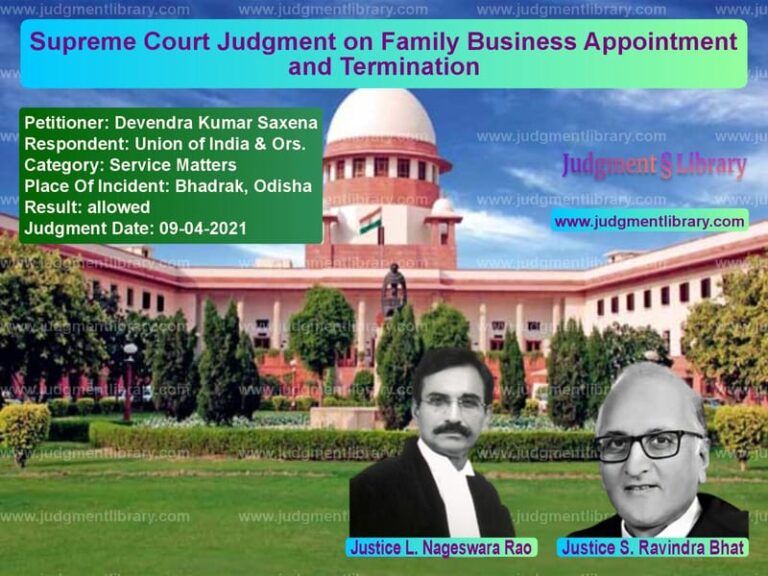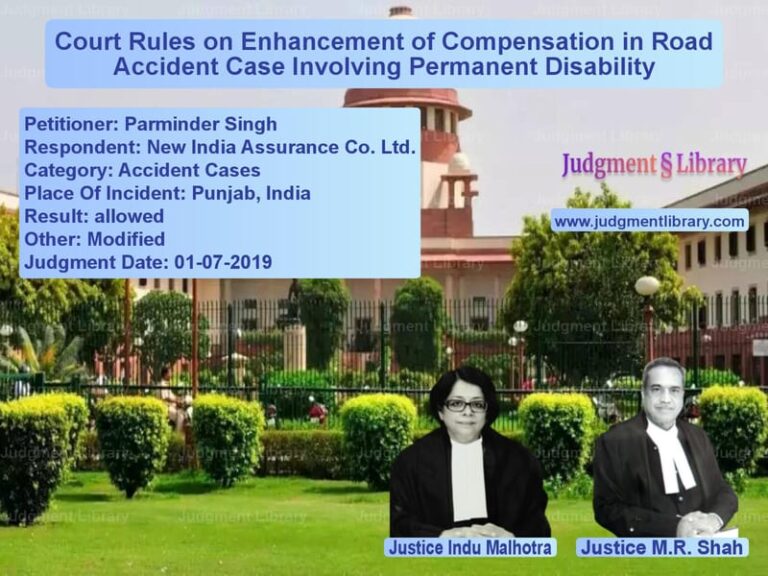Coal India Limited vs. Competition Commission of India: Supreme Court’s Landmark Ruling on Government Monopoly and Competition Law
The case of Coal India Limited & Anr. vs. Competition Commission of India & Anr. is a landmark judgment addressing the intersection of competition law and state-controlled monopolies. The Supreme Court of India, in its judgment dated June 15, 2023, ruled that Coal India Limited (CIL) and its subsidiaries must comply with the Competition Act, 2002, even though they are government-controlled entities operating under the Coal Mines (Nationalization) Act, 1973. This case has far-reaching implications for public sector enterprises, clarifying that they are not immune to competition laws and must operate within the framework of fair market practices.
The judgment arose from CCI’s ruling that CIL abused its dominant position in the coal industry by imposing unfair and discriminatory conditions on buyers. The Competition Appellate Tribunal (COMPAT) upheld the CCI’s decision, leading to an appeal before the Supreme Court. This case marks a significant precedent in applying market competition laws to state-run monopolies.
Background of the Case
CIL, a government-owned entity, is the largest producer and supplier of coal in India. The company operates under the Coal Mines (Nationalization) Act, 1973, which was enacted to ensure that coal, a critical national resource, is distributed in a manner that best serves public interest. However, complaints arose from various stakeholders, including power producers and private enterprises, alleging that CIL misused its dominant position by:
- Imposing one-sided and arbitrary contractual terms on buyers.
- Altering agreements unilaterally, leaving customers with little recourse.
- Engaging in unfair pricing practices that favored certain industries while disadvantaging others.
- Refusing to negotiate supply terms with consumers.
The CCI, after investigating these allegations, found that CIL had engaged in anti-competitive practices, thereby violating Section 4 of the Competition Act, 2002, which prohibits abuse of dominant position. This decision was upheld by COMPAT, leading CIL to challenge the ruling in the Supreme Court.
Key Legal Issues Considered by the Supreme Court
- Whether Coal India Limited, as a government-created monopoly, is exempt from the Competition Act.
- Whether the Competition Commission of India has jurisdiction over pricing and contractual terms of state monopolies.
- Whether the Coal Mines (Nationalization) Act overrides the Competition Act.
- Whether state-owned enterprises should be treated differently from private sector companies in competition law matters.
Supreme Court’s Analysis and Judgment
1. Applicability of the Competition Act to Coal India Limited
CIL argued that, as a state-run monopoly created under the Coal Mines (Nationalization) Act, it should not be subject to the Competition Act. However, the Supreme Court ruled:
“The Competition Act applies to all enterprises, including those controlled by the government. A monopoly created by law does not mean that it can act without scrutiny under competition law.”
The Court emphasized that the purpose of the Competition Act is to ensure fair market conditions, prevent abuse of dominance, and protect consumer interests. The ruling clarified that government monopolies are not exempt from scrutiny under competition law.
2. Conflict Between the Coal Mines (Nationalization) Act and the Competition Act
CIL contended that its functions are governed exclusively by the Nationalization Act, which provides it with control over coal distribution and pricing. The Supreme Court disagreed, stating:
“While the Nationalization Act governs the production and distribution of coal, it does not override the Competition Act. The latter is a general economic law that applies to all market participants, including public sector undertakings.”
The Court ruled that if a state-run enterprise engages in commercial activities, it must adhere to competition principles, even if it was created by a special statute.
3. Abuse of Dominant Position by CIL
The Supreme Court upheld the findings of CCI and COMPAT, concluding that CIL had indeed abused its dominant position by imposing unfair contract terms and restricting market competition. The Court observed:
“Coal India Limited, by virtue of its monopoly, has an obligation to act fairly. Imposing unfair conditions on consumers, altering contracts unilaterally, and engaging in differential pricing constitute an abuse of dominant position.”
The ruling reinforced that dominant enterprises, whether private or state-owned, cannot act in ways that distort market fairness.
4. Role of the Competition Commission of India
CIL challenged the CCI’s authority to regulate its pricing and supply agreements. The Supreme Court firmly rejected this argument:
“The Competition Commission of India has jurisdiction to review market practices of any enterprise, including government monopolies. Its role is to ensure a level playing field and prevent anti-competitive conduct.”
This reaffirmed CCI’s role as India’s primary regulator for competition law, ensuring that all enterprises, including state-owned entities, comply with market fairness principles.
Final Ruling
- The Supreme Court ruled that Coal India Limited must comply with the Competition Act, 2002.
- It upheld the Competition Commission’s jurisdiction to investigate and regulate unfair trade practices by public sector enterprises.
- The Court directed that CIL’s pricing and contractual policies must align with fair competition principles.
- It clarified that even government monopolies cannot impose unfair conditions on consumers.
Implications of the Judgment
This ruling sets a precedent for regulating state-run enterprises under competition law. It underscores that:
- Government-owned companies must operate under fair market principles.
- Public sector monopolies cannot use their dominance to exploit consumers.
- The Competition Commission of India has the authority to regulate unfair trade practices in both public and private sectors.
- State monopolies must ensure that their business practices align with competitive market principles.
Conclusion
The Supreme Court’s decision in Coal India Limited vs. Competition Commission of India is a crucial step in reinforcing fair competition across sectors. By holding that state-run enterprises are subject to competition laws, the judgment ensures that all businesses—regardless of ownership—must adhere to the principles of fairness, transparency, and consumer protection.
This ruling will likely influence future cases involving public sector monopolies, compelling them to operate in a way that promotes healthy competition and prevents market distortions.
Petitioner Name: Coal India Limited and Anr..Respondent Name: Competition Commission of India and Anr..Judgment By: Justice K.M. Joseph, Justice B.V. Nagarathna, Justice Ahsanuddin Amanullah.Place Of Incident: India.Judgment Date: 15-06-2023.
Don’t miss out on the full details! Download the complete judgment in PDF format below and gain valuable insights instantly!
Download Judgment: coal-india-limited-a-vs-competition-commissi-supreme-court-of-india-judgment-dated-15-06-2023.pdf
Directly Download Judgment: Directly download this Judgment
See all petitions in unfair trade practices
See all petitions in Corporate Governance
See all petitions in Judgment by K.M. Joseph
See all petitions in Judgment by B.V. Nagarathna
See all petitions in Judgment by Ahsanuddin Amanullah
See all petitions in dismissed
See all petitions in supreme court of India judgments June 2023
See all petitions in 2023 judgments
See all posts in Corporate and Commercial Cases Category
See all allowed petitions in Corporate and Commercial Cases Category
See all Dismissed petitions in Corporate and Commercial Cases Category
See all partially allowed petitions in Corporate and Commercial Cases Category







